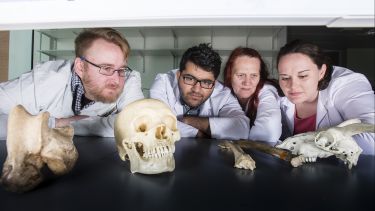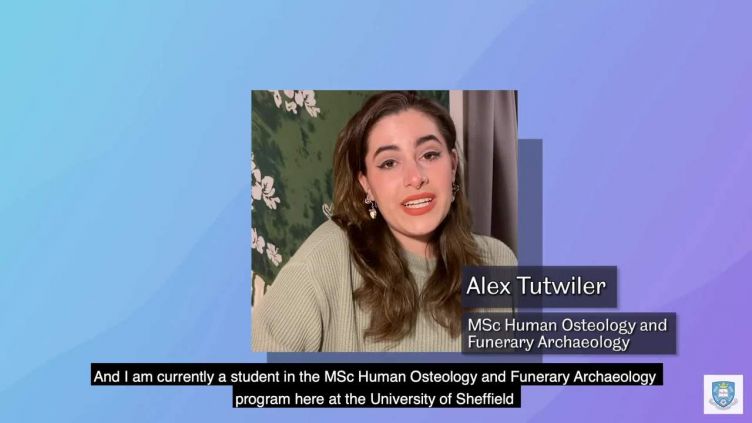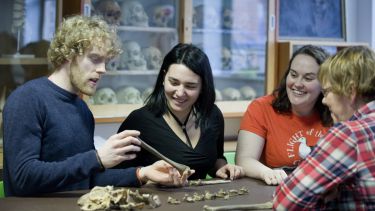Explore this course:
Applications for 2024 entry are now open. Apply now or register your interest to hear about postgraduate study and events at the University of Sheffield.
Human Osteology and Funerary Archaeology
School of Biosciences,
Faculty of Science

Course description
Working in specialist practical labs, you’ll get advanced training in the analysis of human remains. Through advanced anatomy practicals using plastinated prosections (preserved limbs and other human body parts), you'll gain a detailed understanding of skeletal and soft tissue anatomy. Lectures in funerary archaeology, on topics such as the earliest hominin burials, the nature and interpretation of the burial record, and analysis of the residues of funerary ritual, put the subject in context.
As a member of a vibrant research community, you will also develop core skills in research project development and statistical data analysis. You’ll put these skills to work over the summer on an original, independent research project (the dissertation).
Graduates from this course have pursued careers in academia, commercial archaeology, heritage management and museums. Many go on to PhDs.

Modules
Core modules:
- Research Design: Planning, Execution and Presentation
-
This module provides students with the advanced understanding they need to design an effective research project that addresses a question relevant to current debate in archaeology, and in particular to plan a successful MA/MSc dissertation. It comprises six group seminar sessions and three seminars in which students from different courses are streamed to be taught and guided on subject-specific material by experts in the field. The module culminates in a research day during which students present their dissertation plans to their peers and staff assessors. Assessment is in two parts: a succinct Powerpoint presentation of the dissertation proposal and outline and a written dissertation outline and proposal.
15 credits
Students wishing to undertake a work placement will also find this module useful for planning their placement aims and objectives. - Biological Anthropology I
-
The module provides a theoretical background to the study of human skeletal remains as well as essential practical skills in the osteological analysis of human bone.
15 credits - Dissertation (Journal Paper Style)
-
This module requires students to plan, execute and write up an original research project. This dissertation project is chosen with, and approved by, the designated supervisor, who may or may not be the programme director. Dissertation topics must be based on original research and on the students' own ideas: they must be worthwhile, affordable, manageable within time limits, be capable of supervision within the Department and related to the subject matter on the appropriate Masters. Students who choose this particular type of dissertation will place particular emphasis on synthetic writing and an ability to familiarise themselves with journal publication submission and style. With the exception of the word count the students will follow the editorial guidelines of the Journal of Archaeological Science.
60 credits - Funerary Archaeology
-
This module provides an advanced level exploration of human responses to death in societies around the world from the earliest burials of our hominin ancestors to the present day. Delivered through a series of chronologically-themed lectures and thematic seminars, case studies focus on the nature and interpretation of the burial record, and survey the methods of analysis, theoretical underpinnings and material residues of funerary ritual helping the student to develop a broad knowledge of world-wide burial rites and a nuanced understanding of the discipline of funerary archaeology.
15 credits - Biological Anthropology II
-
These classes expand on the core material covered in AAP680 Biological Anthropology 1 and cover the application of biological anthropology to broad research questions that are of fundamental importance in the study of past communities and societies. Half of the module explores the principal approaches by which analysis of the human skeleton can be contextualised. The other half of the module explores palaeopathological lesions and their interpretation as evidence of health and disease in the past.
15 credits - Advanced Scientific Skills
-
This module builds on existing, and further develops, generic scientific skills to equip postgraduate taught students with strong competences in presenting and reporting their research work using written and oral formats, in analysing data and the scientific literature, and in acquiring and extending their critical analysis skills. Teaching will be delivered using a blended approach with a combination of lectures, workshops, tutorials and seminars together with independent study and on-line teaching.
15 credits
Taught throughout the academic year, the module will be articulated around three units addressing:
Unit 1) Scientific presentation skills. In this unit, students will explore how to develop their academic (writing and oral) presentation skills. Some of the topics taught may include how to formulate a research question and hypothesis, how to find information, and how to structure a scientific essay or report. Students will learn how to communicate effectively their research to a scientific, as well as lay, audience. Emphasis will be placed on short oral communications and poster preparation and presentation. The learning objectives will be acquired through lectures, workshops, tutorials and independent study.
Unit 2) Critical analysis skills. This unit prepares students to develop their ability to analyse and appraise the scientific value of the published and unpublished literature. Workshops and lectures will introduce students to the process of critical appraisal of scientific work.
Unit 3) Statistics and data analysis skills. In this unit, students will learn methods to gather and analyse large datasets. In particular, workshops and lectures will teach students the basics of R coding and statistics for application in biosciences. The unit may also deliver other forms of data analysis relevant to the programme of study. Teaching within this unit will be delivered mainly through on-line material, lectures and workshops. Independent study will be essential to complete the acquisition of skills. - Human Anatomy
-
This module familiarises students with the human musculoskeletal system, providing knowledge of the head, neck and appendicular skeleton and its muscles and nerves, as well as insights into functional, developmental and comparative aspects of human morphology
15 credits - Human Osteology
-
In this module the students are introduced to the human skeleton, both adult and immature, and comparative primate skeletons. They are provided with in depth information on how to recognise individual bones, how to side elements by being familiar with all pertinent landmarks. They will be introduced to the size and shape variation present in the skeleton of Homo sapiens, including variations due to sex, ethnic affinity, and temporal changes.
15 credits
Optional modules:
- Applied Bioarchaeological Science
-
This course acquaints the student with a number of scientific analytical techniques and methods which are pertinent to the interpretation of key questions in bioarchaeology. These include histology and microscopic, chemical and isotopic techniques, ancient DNA analysis, lipid analysis and proteomics. It provides a theoretical introduction as well as some practical experience in sample preparation methodologies, data collection and analysis. The potential and limitations of methods are discussed through specific case studies.
15 credits - GIS for Archaeologists
-
Introduce the principles, methods and data structures employed in the analysis and reconstruction of archaeological landscapes using spatial technologies. Provide hands-on training in the application of ArcGIS in archaeological research and professional practice. Enable students to develop skills in interpretation and problem-solving using GIS. Develop students' critical understanding of how spatial technologies are used in archaeological research.
15 credits - Human Evolution: Theory and Practice in Research
-
This seminar module will present both historical and current issues in the study of human evolution, including new hominid fossil descriptions, debates over interpretations and explanatory models of primate and hominid palaeobiology, theoretical and philosophical topics in evolution, and practical and technological advances in early hominid fossil and archaeological interpretation. In some weeks, students will be required to prepare materials to lead the seminars, and occasional group work exercises will be introduced. The seminar topics will change from year to year to reflect new research, staff projects, guest lecturer availability, and student interests.
15 credits - Evolutionary Anatomy
-
This module incorporates lectures and practical demonstration (laboratory) sessions to explore the application of anatomical principles to the comparison and interpretation of the hominid and primate fossil record. The schedule is co-ordinated with that of AAP683, and incorporates additional material in lab sessions to understand the functional and comparative anatomy of modern and extinct hominoid primates. Demonstrations apply the knowledge of musculoskeletal and comparative anatomy to interpretation of hominid fossil specimens (casts and published information), and to understand the evolutionary adaptations of the hominid lineage.
15 credits
The content of our courses is reviewed annually to make sure it's up-to-date and relevant. Individual modules are occasionally updated or withdrawn. This is in response to discoveries through our world-leading research; funding changes; professional accreditation requirements; student or employer feedback; outcomes of reviews; and variations in staff or student numbers. In the event of any change we'll consult and inform students in good time and take reasonable steps to minimise disruption.
Open days
An open day gives you the best opportunity to hear first-hand from our current students and staff about our courses.
Find out what makes us special at our next online open day on Wednesday 17 April 2024.
You may also be able to pre-book a department visit as part of a campus tour.Open days and campus tours
Duration
1 year full-time
Teaching
You can expect a balanced timetable of lectures, seminars and practicals. You’ll have access to specialist labs and world-class reference collections.
We integrate humanities and science-based approaches to nurture a deeper understanding. You’ll have the opportunity to explore different viewpoints and make up your own mind about their strengths and weaknesses.
We’ll help you to develop your critical thinking as well as your practical skills. What we ask of you, as a member of our lively academic community, is that you challenge, question, and explore.
Fieldwork
All our masters students have the option to get involved in research projects – in the UK, Europe and elsewhere – even if fieldwork isn’t part of your course.
Assessment
Your assessments will include essays, portfolio work, practical work, exams and a journal-style paper.
Department
School of Biosciences
The School of Biosciences brings together more than 100 years of teaching and research expertise across the breadth of biology.
It’s home to over 120 lecturers who are actively involved in research at the cutting edge of their field, sharing their knowledge with more than 1,500 undergraduate and 300 postgraduate students.
We carry out world-leading research to address the most important global challenges such as food security, disease, health and medicine, ageing, energy, and the biodiversity and climate crises.
Our expertise spans the breadth and depth of bioscience, including molecular and cell biology, genetics, development, human physiology and pharmacology through to evolution, ecology, biodiversity conservation and sustainability. This makes us one of the broadest and largest groupings of the discipline and allows us to train the next generation of biologists in the latest research techniques and discoveries.
Student profiles

I find my MSc exciting mostly because it lies between the scientific and humanistic fields of research, therefore it invites the students to learn how to think outside the box and link all the information together to solve a greater puzzle.
Entry requirements
Minimum 2:1 undergraduate honours degree in an arts, humanities or science subject.
Your interest in and understanding of archaeology is more important than what you studied at undergraduate level: we may consider degrees in other subjects if you display an interest in archaeology in your application.
Overall IELTS score of 6.5 with a minimum of 6.0 in each component, or equivalent.
If you have any questions about entry requirements, please contact the department.
Fees and funding
Apply
You can apply now using our Postgraduate Online Application Form. It's a quick and easy process.
Contact
archaeology-masters@sheffield.ac.uk
+44 114 222 2900
Any supervisors and research areas listed are indicative and may change before the start of the course.
Recognition of professional qualifications: from 1 January 2021, in order to have any UK professional qualifications recognised for work in an EU country across a number of regulated and other professions you need to apply to the host country for recognition. Read information from the UK government and the EU Regulated Professions Database.
